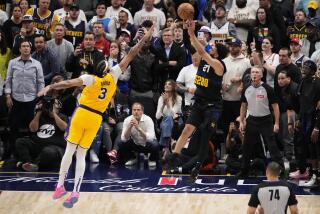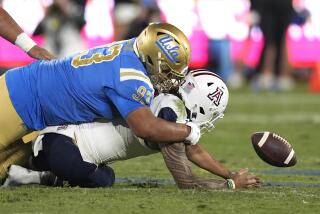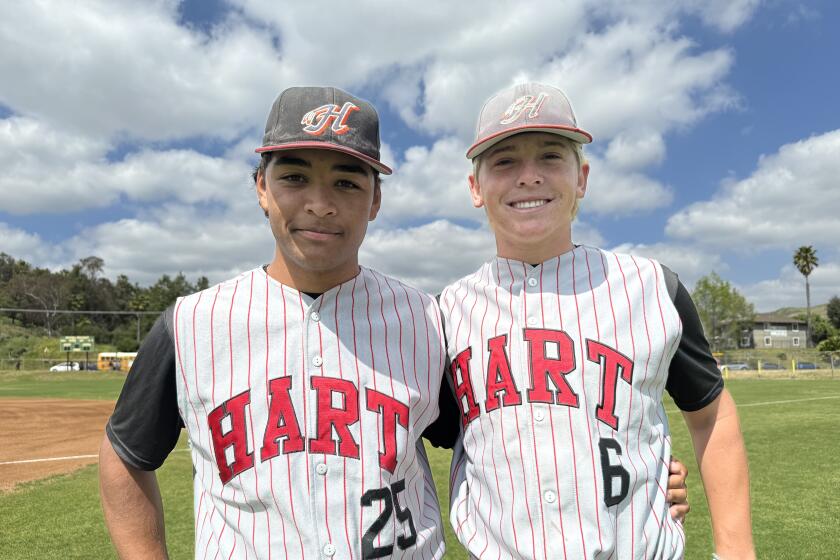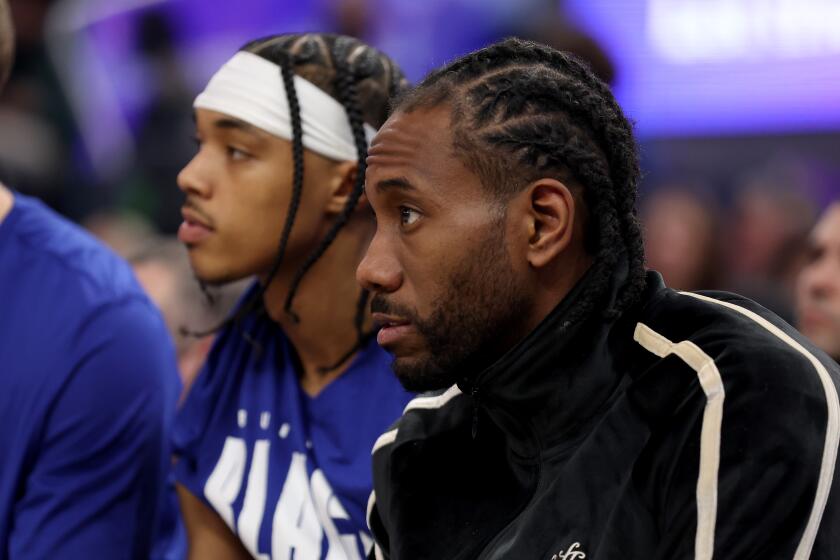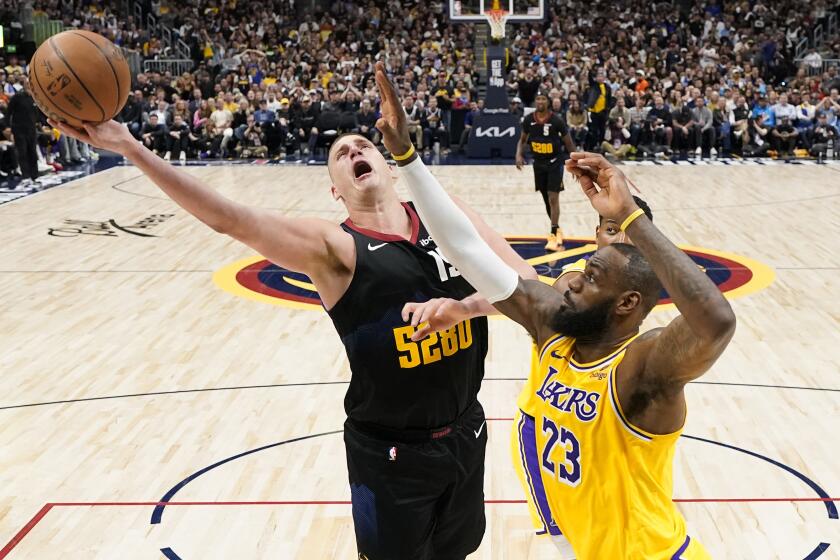Bullets’ Unseld Expects Even More From His Overachievers
Whenever rookies moaned about bumps and bruises during the Washington Bullets’ strenuous, monthlong training camp, team trainer John Lally would point them in the direction of the imposing Grotto of Lourdes hovering over the St. Mary’s College campus in Emmitsburg, Md.
The Bullets finished their preseason without any major injuries, but are not expecting any miracles in the regular season.
Wes Unseld was credited with performing a minor miracle last season, his first full season as head coach, in going 40-42 with a team minus a legitimate center and point guard, the two main ingredients for most championship clubs.
By barely missing the Eastern Conference playoffs and then failing to draw the lucky slip in the NBA lottery, the Bullets also lost the opportunity to draft one of the prime big men leaving college: Pervis Ellison, Stacey King, Danny Ferry or J.R. Reid.
Desperate for rebounding help and inside scoring, Washington opted for power forwards Tom Hammonds of Georgia Tech and Ed Horton of Iowa and center Doug Roth of Tennessee.
But none is considered an impact player. Hammonds and Horton will be nurtured on the Bullets’ second unit, while Roth starts the season on the injured list after sinus surgery that caused him to miss most of training camp.
“Ordinarily,” Unseld said, “you like to bring rookies along slowly and let them get used to the demands of the pro game. But if we’re going to get better, Hammonds and Horton will have to grow up quickly.”
The only other new face on the roster is retread center Mel Turpin, who lost 20 pounds this summer in an effort to return to the NBA after a season in Spain. But Turpin, 6-foot-11 and 265 pounds, who was discarded by the Cleveland Cavaliers and Utah Jazz, failed to impress anyone in the exhibition season.
As assistant coach Jeff Bzdelik said, “We want to run the basketball and use a passing game, but Mel has never played that way before. He’s used to setting up down low and having the ball come to him. We haven’t given up on him as yet, but, frankly, he has not done what we had hoped.”
Unless the Bullets engineer a trade in the next few days, with guard Jeff Malone and forward John Williams considered their only marketable players, Unseld must count on improvement from within.
In essence, for the Bullets to remain competitive in the Eastern Conference, it will require another season of overachieving, plus a significant contribution from Williams, guard Ledell Eackles, forward Mark Alarie and forward Harvey Grant, who formed the nucleus of Unseld’s effective second unit last season.
A persistent problem for Unseld last year was generating enough offense from his starters, who invariably ended the first quarter with a large deficit. Rival teams were able to rig their defenses to stop Malone (21.7 points) and forward Bernard King (20.7).
To alleviate the pressure on his scoring leaders, Unseld has elevated Williams, his all-purpose sixth man, to a starting role at power forward, a position filled last season by Terry Catledge, who was lost in the expansion draft. Catledge was an effective rebounder (7.2) but uncomfortable in the Bullets’ motion offense.
“Teams that win have at least three scorers in their starting lineup,” King said. “Adding Williams will be a real plus, because he’s also an exceptional passer. But for us to get off to a better start than last season (9-21), we have to be assertive from the beginning of every game.”
The switch puts a heavy burden on Williams, who turned 23 last month, but he has three seasons of pro experience after leaving college after his sophomore year at Louisiana State.
“John is at a pivotal point in his career,” Unseld said. “This year, he has to let the league and world know that he’s going to be a legitimate star.”
Williams, who has fought a weight problem since his rookie year, said the move whets his appetite.
“I want it,” he said. “The great players in this league accept the challenge of coming through in the clutch. I’ve put in my years as a supporting player for Jeff, Bernard and Moses (Malone). I earned their respect. Now, I have to earn the respect of the younger players on this team by becoming a team leader.”
By promoting Williams, Unseld leaves a void on the second unit, which won a number of games in the second half of last season with its up-tempo offense and trapping defense.
To remedy this situation, Williams will be asked to play about 40 minutes a game. At the same time, Hammonds and bulked-up Grant will be counted on to allow King (33 next month) to play fewer minutes.
King, the team’s inspirational leader, showed signs of fatigue in the stretch drive last season. But King reported to camp in the best shape since suffering a career-threatenning knee injury with the New York Knicks in 1985.
“I’m not guaranteeing a playoff spot, but we should definitely be better than last year,” King said.
“We’re certainly have improved depth this season. We have 11 players who can contribute, and a number of them can play several positions. But to be better, especially on the road (10-31 last season), we have to apply more defensive pressure and get out and run the ball.”
Unseld also elected to stick with his veteran backcourt of Malone, Walker, Eackles and Steve Colter, despite the Bullets’ last-place finish in three-point shooting in 1988-89.
Alarie, who earned more playing time with a strong finish, and Williams should help spread the floor with their outside shooting, opening the middle for King, Eackles and Walker.
“Guys coming off the bench this year have to be sure what their roles are,” King said. “Eackles knows he’s in there to score. Hammonds might have to come in to help rebound. The same for Horton.
“But the big thing is that we’re comfortable with our motion offense this year. A year ago, we were feeling our way. Now, we know all its nuances and idiosyncrasies.
“We wore a lot of teams down in the fourth quarter last season with our offensive style and platoon system. There is no reason why we shouldn’t do an even better job of it this year.”
To which Unseld adds, “Last year, I really didn’t know what to expect, but I had to be encouraged by the players’ 100 percent effort. This year, I’m a little bit more optimistic. But, frankly, when I look at our early schedule (eight of the first 11 on the road, including a six-game Western swing), I’m scared to death.”
More to Read
Get our high school sports newsletter
Prep Rally is devoted to the SoCal high school sports experience, bringing you scores, stories and a behind-the-scenes look at what makes prep sports so popular.
You may occasionally receive promotional content from the Los Angeles Times.
